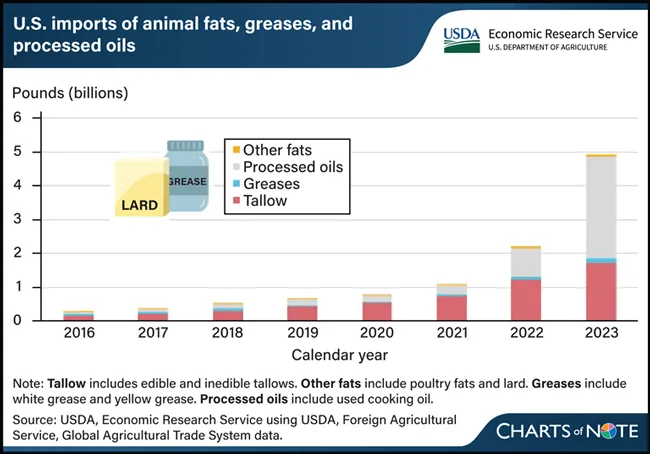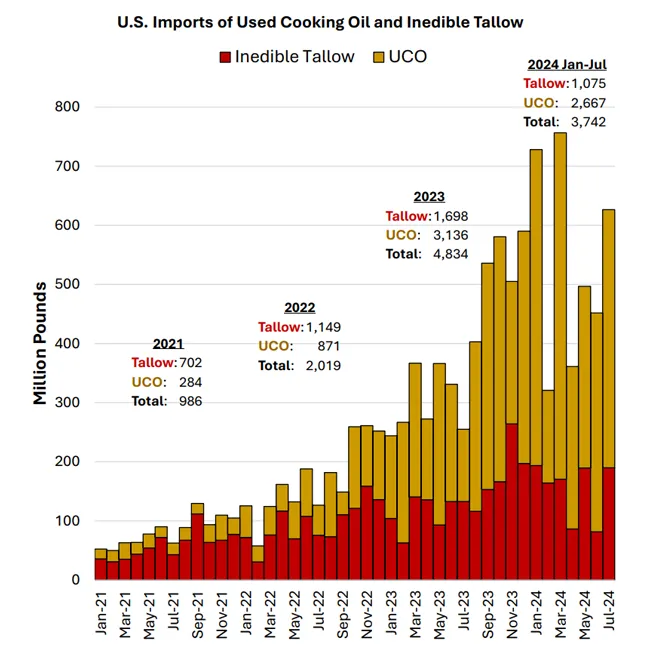Staff Reporter
Biofuel Group Asks EPA for Update on UCO Imports Audit

[Stay on top of transportation news: Get TTNews in your inbox.]
Citing harm to American biofuel producers, the Renewable Fuels Association has questioned the U.S. Environmental Protection Agency about its audit of imported used cooking oil (UCO) contents.
In a Sept. 17 letter to EPA Administrator Michael Regan, association president and CEO Geoff Cooper expressed concerns “about the legitimacy of these imported feedstocks,” suggesting some may contain palm oil or other mislabeled substances.
Alarm has grown in the U.S. in recent months over soaring UCO imports from China, potentially displacing more regulated American-made biomass-based diesel.
Earlier this year, the American Soybean Association’s chief economist Scott Gerlt reported that China began diverting UCO to the U.S. in mid-2023, after Germany sought European Union intervention on Chinese waste oil imports. European UCO imports from China fell by nearly 600,000 metric tons in 2023, while U.S. imports rose by over 700,000 metric tons.
“What was going to the EU was largely rerouted to the United States, where concerns over the integrity of UCO imports had not been raised,” Gerlt stated.

U.S. imports of animal fats, greases, and processed oils — including used cooking oil — skyrocketed in 2023. (USDA)
The U.S. Department of Agriculture reported in July that demand for domestic biomass-based diesel from UCO and similar substances has surged due to efforts to reduce greenhouse gas emissions. These feedstocks accounted for 37% of total biomass-based diesel production in 2023, up from 17% in 2020. U.S. imports of these substances jumped to 3 billion pounds in 2023 from 900 million pounds in 2022.
In June, six U.S. senators expressed concern to federal agencies about potential harm to American biofuel producers from UCO imports with questionable ingredients. Sens. Chuck Grassley and Joni Ernst (R-Iowa), Pete Ricketts and Deb Fischer (R-Neb.), Roger Marshall (R-Kan.) and Sherrod Brown (D-Ohio) warned that some imports may contain palm oil linked to deforestation, violating U.S. renewable fuel standards and exploiting tax incentives. This is a “fraudulent value distortion,” they said.
RELATED: CARB’s Biofuel Changes Raise Concern
The senators also argued that the lower carbon intensity score of imported UCOs unfairly disadvantages domestic agricultural feedstocks, which face stricter regulations and reporting requirements.
Cooper’s recent letter, also sent to USDA, CBP and the U.S. Trade Representative, highlighted the surge in potentially counterfeit UCO and tallow imports. He revealed that monthly imports have increased 12-fold since January 2021, with nearly one-sixth of U.S. biomass-based diesel now made from imported UCO or tallow.

Nearly one-sixth of U.S. biomass-based diesel is now made from imported UCO or tallow, Cooper said. (RFA)
Cooper noted that these imports, mainly from China and Brazil, are displacing American-made biofuel blends despite being subject to less stringent regulations. Meanwhile, these two countries “maintain punitive import tariffs on U.S. biofuels,” he said. He called for the EPA to release information about its ongoing audit of imported feedstocks, including timeline, findings and corrective actions.
A key issue, Cooper explained, is the EPA’s lack of requirements for chemical analysis or other verification methods for imported feedstocks. This regulatory gap means the EPA must rely on unverified statements and records from producers.
“None of the documentation currently required [by the EPA] can be used to definitively verify that imported UCO and tallow feedstocks are being accurately defined and classified,” he added. “Without action by EPA to tighten its verification and recordkeeping requirements, the deluge of questionable imports of UCO and tallow not only threaten to inflict further economic harm on U.S. farmers and biofuel producers, but also to undermine the integrity of the Renewable Fuel Standard program.”
Want more news? Listen to today's daily briefing below or go here for more info:




